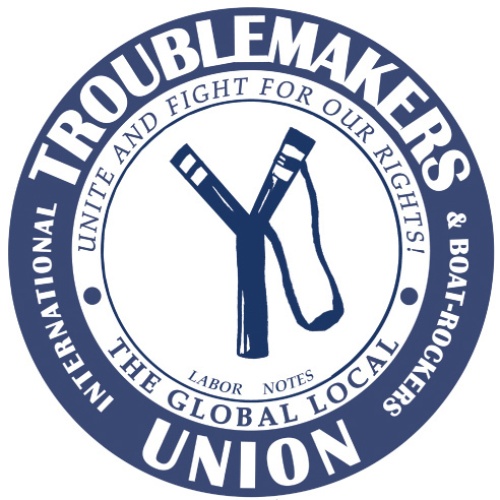Lacking contracts, New Orleans teachers use old-school tactics

By Theresa Moran, Labor Notes
Just months after Hurricane Katrina, the city of New Orleans fired all 7,500 of its teachers. After a seven-year legal battle, the teachers union won a measure of justice in June when a judge ruled the firings illegal.
In many respects, the victory was too little, too late. Fired teachers will be getting some money for their troubles, but they won't be getting their old jobs back. Nor will the city be getting its public school system back any time soon.
But United Teachers of New Orleans is eager to prove it's not dead yet. Though the union has no contracts at any New Orleans schools, UTNO is fighting for teachers and students through a grassroots, social justice approach to unionism. With a membership of 1,000, about a quarter of all teachers in the city, it's made some notable achievements without collective bargaining rights.
Demolish Schools & Union
Before the 2005 storm, the city oversaw 128 public schools. After Katrina, the state legislature seized the opportunity to privatize. Control of 107 schools deemed low-performing was given to the state-run Recovery School District, which in turn handed the majority to private charter operators.
The Orleans Parish School Board canceled UTNO's contract nine months after the flood. Teachers have no collective bargaining rights written into law in Louisiana, as in many Southern states.
Thus the great experiment in New Orleans -- watched closely by corporate-inspired school "reformers" nationally -- was born. More than 80 percent of New Orleans students now attend charter schools.
Teachers who remained in the profession post-Katrina are now scattered across 80 schools governed by 50 public and private bodies, including the Recovery District, the disappearing Orleans Parish public school district, and a throng of charter operators.
Cash, but little recovery
In the years since Katrina, the federal government has pumped over $3 billion into New Orleans schools, with much of that going to the Recovery District. Charters have also been heavily subsidized, through millions of dollars from high-profile donors like Bill Gates and Oprah Winfrey.
Despite this influx of cash, schools now controlled by the state -- charter and traditional public schools alike -- are not faring well. All 15 of the Recovery District's direct-run schools and 79 percent of its charters received "D" or "F" grades in state evaluations. Only three of its schools got a "B" or higher, the average for the public school district.
Though students have shown some improvement on statewide "end-of-course" exams for seniors, the meaning of these results is questionable. The head of Louisiana's education department has criticized the tests for failing to match federal standards.
Governor Bobby Jindal's sweeping education legislation, passed in April, implicitly blames teachers for such scores. The new law will make reaching tenure a near impossibility -- partly because students' test scores make up 50 percent of their teachers' evaluations.
Under the new law, teachers must receive five straight "highly effective" ratings within six years to gain tenure. Veteran teachers will risk losing tenure after a single "ineffective" rating.
The shrinking pool of veteran teachers, historically the core of New Orleans' black middle class, is being replaced by recent college graduates, recruited from out of town by Teach for America.
Besides paving the way for privatization, the firings were an attempt to kill the teachers union. "We were the strongest union in the state," says Katrena Ndang, a retired high school teacher who worked as an UTNO community organizer after the storm. "We know that was the reason because people say to us, 'You're still around? I thought we got rid of you.'"
For "reformers" who blame education's problems on bad teachers and seek to cut costs, the teachers union was seen as an obstacle. Veteran teachers cost more than recent graduates and unionized teachers are harder to fire.
Into the Community
Senior teachers say years on the job translate into connections to community -- which has been key to UTNO's visibility and voice.
The union has close ties with the NAACP. It has partnered with building trades unions to renovate classrooms in public schools and worked with clergy to develop education committees at churches to discuss the impact of the schools overhaul. The union meets regularly with a day laborer worker center and brings members to its rallies.
"You have to recast your union as not just an organization that's looking out for teachers," says Dave Cash, a social studies teacher and UTNO recording secretary. "You have to care about everything that's happening in the community."
Visibility has turned into victories on issues affecting students and teachers alike.
When John Dibert Elementary School was taken over by a charter, the new management announced it would be closing its pre-kindergarten. The union worked with parents to organize rallies and the program was saved.
Earlier this summer, the Algiers Charter School Association, one of the largest charter operators in the city, announced it would be laying off teachers in droves and transferring principals from high-performing to low-performing schools. UTNO rallied with parents and turned members out to a 400-person public meeting, convincing the charter to postpone its radical plans.
The union will work with local groups to develop candidates for the school board election in November. The board now directly runs just six schools and oversees 12 charters. The union hopes to stave off charterization of the few remaining Orleans Parish schools.
UTNO Vice President Jim Randels says, "A locally elected school board that has as its core interest public education for the citizens it represents is going to handle fiscal matters differently than someone looking to develop profit margins."
Racial Healing
Since Katrina, both the charters and the state-run Recovery District have turned to teacher recruitment programs like Teach for America, a corporate-backed nonprofit that brings in young college graduates, most without any teaching background, and whips them through a six-week boot camp.
They are assigned to two-year teaching stints. Most don't stay in the profession, ensuring a constant churn of low-cost, compliant, eager young teachers. TfA opposes the job security teacher unions have won.
Unsurprisingly, there's animosity between the young, mostly white, out-of-town recruits and veteran teachers, who are predominantly African American.
UTNO began a "racial healing" group to bring together new teachers with veteran and retired teachers and community members.
Getting the two groups together proved a stiff climb. Ndang, who facilitates the group, said charter operators told new teachers, "Don't have anything to do with veteran teachers because they're the cause of the problems you're going in there to solve."
The monthly group discusses frankly everything from the New Orleans culture to classroom discipline to the school-to-prison pipeline.
For veteran teachers, it's a way to help students by making sure new teachers have the tools to be effective and culturally competent. Young teachers get guidance from teachers rooted in the community and can fill some of the gaps left by their skimpy training. Out of this space, the union has developed a formal mentorship program.
"Sometimes it's a crying session," Ndang said. "To come to that meeting and have people understand the things you're going through is one of the greatest things that could happen to them."
The group has proved to be the union's most effective recruitment tool for new teachers.
Present in the Workplace
Though the union has neither collective bargaining agreements nor a majority among teachers, it's still striving to address workplace issues.
In the six schools run by the school district, the union has about 80 percent density. There, most work rules from the old contract are still followed. Members have regular meetings with principals and union reps negotiate solutions.
UTNO has an agreement with the Recovery District that gives it access to the schools, dues check-off for teachers who sign up, and the right to partner with the district on professional development training. The union represents members when workplace issues arise.
When the Recovery District decided last year to use the state's new test-based evaluations to fire teachers, the union won an individual appeals process and UTNO President Larry Carter spent time in July sitting in on those hearings.
While the union has not been able to stop the conversion of public schools to charters, it has brought clarity to the process. At George Washington Carver High School, officials refused to give straight answers on who would be losing their jobs when and what the reapplication process would be. The union forced them to sit down with teachers and discuss the transition.
Outreach like the racial healing group, professional development sessions, and good old-fashioned door-knocking have helped UTNO keep members signed up and relating to the union. The long-run goal is collective bargaining, but Carter estimates that covering all city teachers would require more than 60 agreements.
"We're not in a position to really win much right now," acknowledges Cash, the UTNO secretary. "But we're in a position to prepare ourselves for a time when times change. A lot of people believe that all the money coming into New Orleans right now will dry up. Are we going to be ready to pick up the pieces when that happens?"
(Photo of UTNO march by UTNO via Labor Notes.)
Tags
Labor Notes
Labor Notes is a media and organizing project that has been the voice of union activists since 1979.
